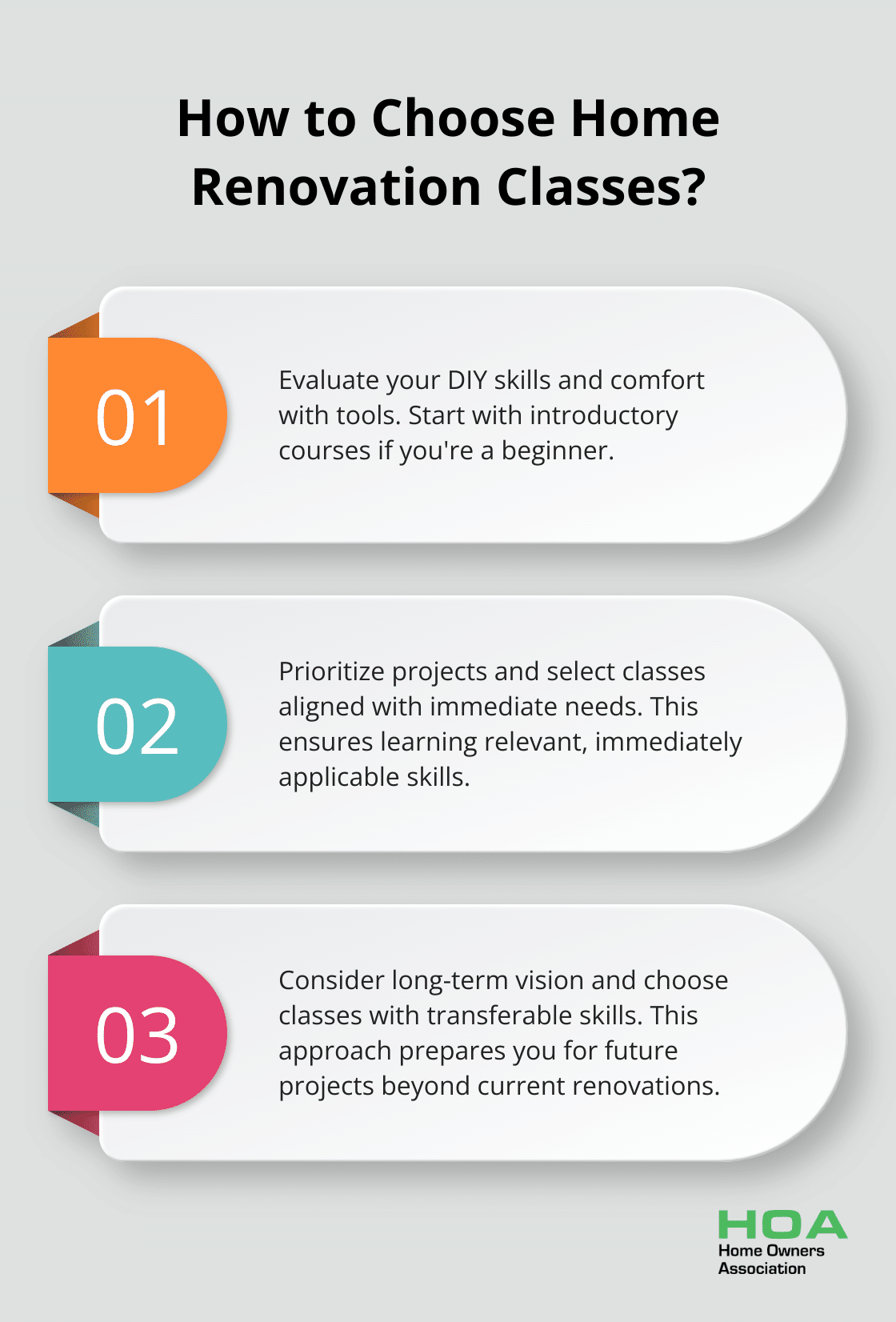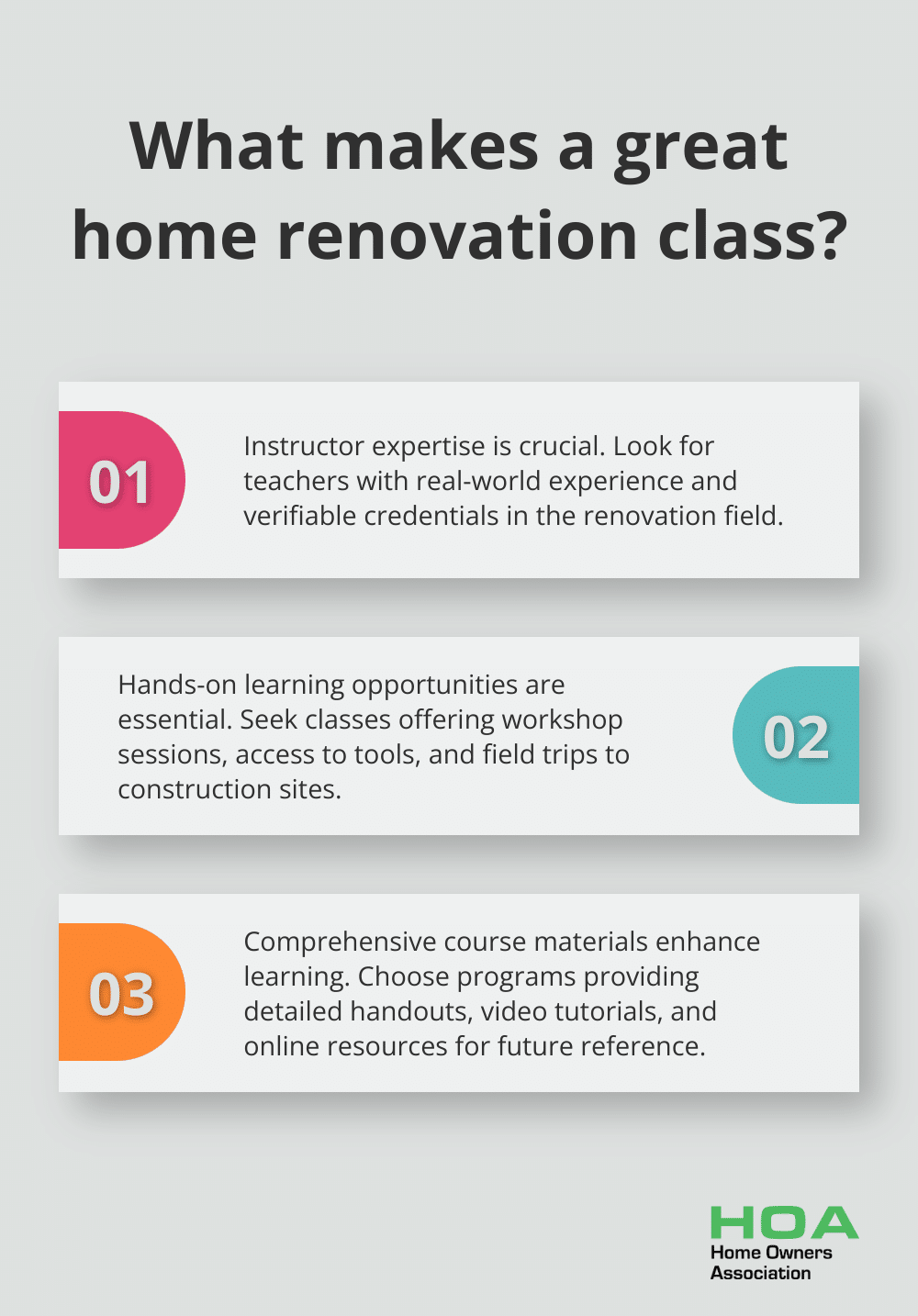
At Home Owners Association, we understand the value of continuous learning for homeowners. Mastering home renovation skills can save you money and give you the confidence to tackle various projects.
Classes for home renovation offer a structured way to acquire these valuable skills. This guide will help you navigate the process of selecting the best renovation classes to suit your needs and goals.
What Are Your Renovation Goals?
Evaluate Your DIY Prowess
Before you select home renovation classes, take an honest look at your existing skills. Are you comfortable using basic tools? Have you completed any home improvement projects before? Understanding your starting point will help you choose classes that challenge you without overwhelming you. For instance, if you’ve never held a power tool, you might want to start with introductory courses before you tackle advanced carpentry.
Pinpoint Your Project Priorities
Project prioritization is a process for selecting the initiatives that maximize the value you deliver to the organization with your limited resources. Make a list of the specific renovations you want to tackle. Do you want to update your kitchen, remodel a bathroom, or perhaps add a deck? Each project requires different skills and knowledge. By identifying your priorities, you can select classes that directly align with your immediate needs. This focused approach ensures you learn relevant skills that you can apply right away.
Think Long-Term
While you address immediate projects, don’t lose sight of your long-term home improvement vision. Consider how the skills you learn now might apply to future projects. For example, if you currently focus on interior renovations but dream of landscaping your backyard, look for classes that offer transferable skills (like project planning or basic construction techniques).
Consider Your Learning Style
People learn in different ways. Some prefer hands-on experience, while others thrive with theoretical knowledge. Think about how you learn best. Do you prefer watching video tutorials, reading textbooks, or practicing with tools? Your learning style will influence which type of class suits you best (online courses, in-person workshops, or a combination of both).
Assess Your Time Commitment
Renovation classes require time and dedication. Evaluate how much time you can realistically commit to learning. Some courses might require a few hours a week, while others could demand more intensive study. Be honest with yourself about your availability to ensure you choose a class you can fully engage with and complete.

Now that you’ve clarified your goals and assessed your current abilities, you’re ready to explore the various types of home renovation classes available. Let’s look at the options that can help you acquire the skills you need to transform your home.
Exploring Home Renovation Class Options
Online Courses and Video Tutorials
The digital age has revolutionized learning. Online courses and video tutorials offer unparalleled flexibility, allowing you to learn at your own pace from home. Platforms like Udemy, Skillshare, and YouTube host a wide range of renovation-related content, from basic DIY skills to advanced techniques.

Home Depot provides free online DIY workshops covering topics like tiling, painting, and basic plumbing. These courses often include downloadable resources and step-by-step guides, making them an excellent starting point for beginners.
In-Person Workshops
Hardware stores and home improvement centers offer hands-on workshops. These classes provide practical experience under the guidance of experienced professionals. Bunnings Warehouse runs DIY workshops across Australia, covering topics like painting, decking, and garden design.
In-person workshops allow you to ask questions in real-time and practice with tools and materials. They benefit those who learn best through hands-on experience.
Community College Courses
For a more comprehensive learning experience, community college courses offer in-depth knowledge on specific renovation topics. TAFE NSW offers courses that develop foundational skills across joinery, shopfitting, carpentry and bricklaying.
Community college courses typically combine theoretical knowledge with practical skills, making them ideal for those seeking a deeper understanding of renovation techniques.
Professional Certification Programs
For those aiming to take their skills to a professional level, certification programs provide rigorous training and industry-recognized credentials. These programs often cover advanced topics and building codes, preparing you for more complex renovation projects.
Home Owners Association Resources
While various learning options exist, Home Owners Association members have access to exclusive educational resources and expert advice. This personalized guidance proves invaluable when applying newly acquired skills to real-world projects.
As you consider these options, think about which format aligns best with your learning style and goals. The next section will discuss key factors to consider when selecting the perfect home renovation class for you.
What Makes a Great Home Renovation Class?
Instructor Expertise Matters
The quality of your instructor directly impacts the value of your class. Look for teachers with real-world experience in the renovation field. An instructor who has worked on actual projects can provide insights that go beyond textbook knowledge. For example, a former contractor turned educator can share practical tips on dealing with unexpected issues during renovations.

Check the instructor’s credentials and years of experience. Many reputable programs list their instructors’ backgrounds online. Don’t hesitate to reach out and ask about their experience if it’s not readily available.
Hands-On Learning Opportunities
Theory is important, but nothing beats hands-on practice when it comes to home renovation skills. Classes that offer practical components allow you to apply what you’ve learned in a controlled environment. This hands-on experience builds confidence and helps you retain information better.
Look for courses that include workshop sessions or provide access to tools and materials. Some programs even offer field trips to construction sites or renovation projects in progress. These experiences are invaluable for understanding the realities of home improvement work.
Comprehensive Course Materials
The resources provided by your chosen class can significantly enhance your learning experience. Look for courses that offer detailed handouts, video tutorials, or online resources you can reference after the class ends. These materials serve as valuable references when you start your own projects.
Some programs provide tool kits or material samples as part of the course fee. These can be especially useful for beginners who are just starting to build their collection of renovation tools.
Value for Money and Time
While cost shouldn’t be the only factor in your decision, it’s important to consider the value you’re getting for your investment. Compare the course fees with the depth of content, duration, and additional resources provided. The cheapest option isn’t always the best value.
Also, consider the time commitment required. Some intensive programs might offer more content in a shorter period, while others spread out the learning over several weeks or months. Choose a format that fits your schedule and learning pace.
Student Feedback and Success Stories
Past students’ experiences can provide valuable insights into the quality of a class. Look for reviews and testimonials from previous participants. Pay attention to comments about the practical applicability of the skills learned and the overall learning experience.
Many programs showcase success stories of students who have completed significant renovation projects after taking their courses. These case studies can give you a realistic idea of what you might achieve with the knowledge gained from the class.
When evaluating home renovation classes, consider these factors carefully (instructor expertise, hands-on opportunities, course materials, value, and student feedback). The right class will not only teach you valuable skills but also inspire you to tackle your home improvement projects with confidence.
Final Thoughts
Selecting the right classes for home renovation will equip you with the knowledge and confidence to tackle your projects successfully. You can find courses that match your goals, skill level, and learning preferences through online tutorials, in-person workshops, or certification programs. Each option offers unique benefits to help you grow your renovation skills.

Continuous learning proves invaluable for homeowners. You will save money on future projects and gain the ability to maintain and enhance your property’s value over time. The satisfaction of completing renovations yourself is immeasurable, and the skills you learn will serve you well throughout your homeownership journey.
We at Home Owners Association encourage you to take the next step in your home renovation education. Enroll in a class that aligns with your immediate needs and long-term goals. Our team stands ready to support you with expert advice, resources, and exclusive benefits tailored to the Melbourne, Australia market.





